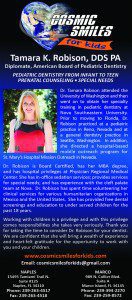By Tamara K Robison, DDS, MBA, PA, Board Certified Pediatric Dentist – Naples and Marco Island


being and development is at risk when ECC is established. The ability to speak, eat, and maintain a normal occlusion can be negatively impacted in a child with ECC. Dental problems affect a child’s overall stamina and self-esteem, the feeling of discomfort in the mouth becomes something they regard as a normal fact of life, they eat with pain, go to school with pain, and sleep with pain. Children with ECC have more aversive dental experiences at younger ages. The children endure dental pain and encounters with the dentist at such a young age that their psychological development can be negatively impacted. Children with bad past dental experiences may develop into adults with dental fears. Consequently, these adults then model dental fears to their children, setting up generational patterns of dental fear and dental neglect.
There is a substantial body of evidence based literature suggesting that maternal oral health can influence the oral health of her infants and children. Mutans Streptococci (MS) is the oral bacteria responsible for the initiation of the caries process. High levels of MS in the mother can be transmitted to the infant, putting the infant at higher risk for caries. The transmission of bacteria usually happens during kissing and the sharing of cups, utensils and straws. Treating the dental and periodontal disease in mothers will lower the levels of bacteria and thereby reduce the transmission of the bacteria from mother to infant. Maternal use of 100% xylitol chewing gum can reduce the levels of dental disease causing bacteria and has been shown to lower the cavity risk for infants and children. The recommended amount of xylitol is three pieces of gum, four times a day. Additionally, maternal use of chlorhexdine mouth rinse and applications of fluoride varnish can reduce maternal oral bacterial levels.
The prenatal period may be a time when women are more accepting of integrating healthier life style choices to benefit themselves and their children. Obstetricians are in a position to help educate mothers regarding oral health, which will result in improved clinical outcomes. This can be accomplished through the oral health screening, counseling and referral of pregnant patients for dental treatment. Oral health education should also be incorporated into prenatal educational classes. The collaboration of medical and dental healthcare providers has the potential to benefit women, children and families, by having a positive impact on their overall health care, through coordinated delivery of treatments.
 Southwest Florida's Health and Wellness Magazine Health and Wellness Articles
Southwest Florida's Health and Wellness Magazine Health and Wellness Articles
